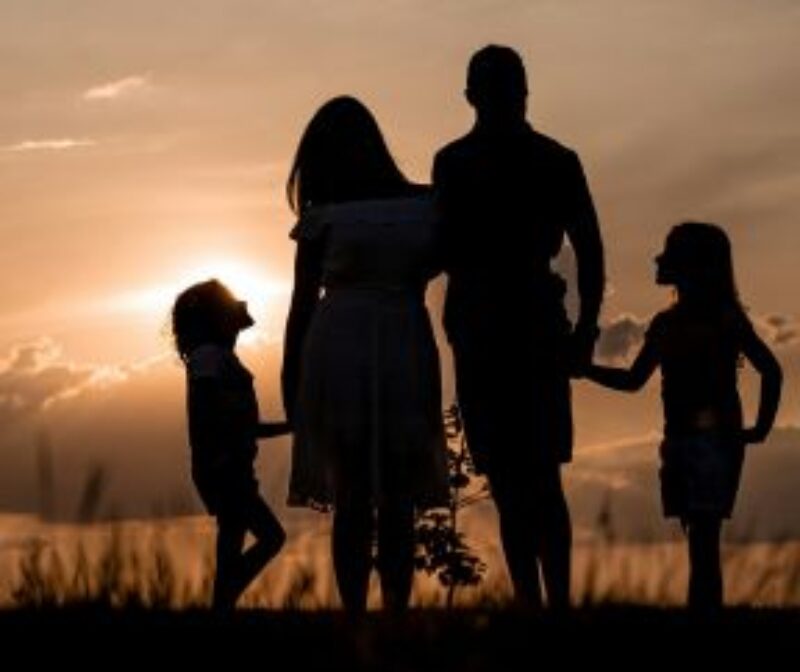What can we learn from missionary families about family resilience?
Growing up in Cameroon, Africa as a missionary kid, meant that my immediate family (my dad, mom, my younger brother and younger sister) were my closest and most reliable relationships, specifically because we were able to make sense of our unique and nuanced context together. For most families, their family of origin provides their most reliable relationships, but in missionary families, what is unique is often how isolated and stressful are the circumstances surrounding the family unit. Still, I have many memories of connecting over food, family traditions, going on family trips and playing games together. They are also filled with difficult transitions (like leaving Cameroon every three years to spend a school year in the US) and readjusting to different contexts. There were also daily stressors such as sometimes (randomly) not having electricity or running water, communicating in a different language, or having to navigate acculturation stress.
Research shows that family relationships are central in creating well-being. These relationships offer social support, regulation and self-worth (Thomas et al., 2017). My own experiences in my family unit, as well as reviewing the impact of these relationships from research, illustrates the importance of intentionally strengthening these bonds and building resilience within the family unit. How does one do that, you might ask? My current research explores the strengthening of bonds as it expands on the work of psychologist Froma Walsh, who developed a model for family resilience. (2017)
Her work provides a strong foundation for understanding how a family can increase their familial resilience and my dissertation project explores the specific ways that missionary families in high-risk contexts build resilience as a family. This high-risk context can be filled with daily life stressors (e.g., traffic and poor road conditions, specific cleaning for food and items…) that are constantly integrated into the work that missionaries do. Additionally, the nature of mission work is that life and work are never fully separated. There can also be high stressors such as political or civil unrest, cross-cultural communication, burglaries and evacuations. This research has broad implications for organizations and churches who support the work of missionary families, but the findings also apply to individual family units and point to how families can develop their resilience.
Because each family system is different and comes from different cultural backgrounds, it’s essential that in the face of challenges we understand that there is no single effective coping response to stress (Walsh, 2017). Instead, family resilience should include varying strategies that can extend over time and evolve in a continual process of growth and change. All families have the potential to strengthen their family resilience as they utilize the resources available to them.
Three factors shown to develop family resilience
Walsh (2017) names and defines three key processes involved in family resilience that can be learned and formed. These factors are:
- “belief systems,
- organizational processes, and
- communication processes” (Walsh, 2017, p. 19).
Belief Systems
Belief systems aid in making meaning of adversity, creating a positive outlook, and orienting to transcendence and spirituality. Making meaning together as a family strengthens trust in each other. This loyalty and trust in one another enables the unit to work through adversity with a sense of coherence.
For example, one person I interviewed for my research shared a belief that
“it’s important, too, for the parents to take care of their own health: holistically, spiritually, relationally, physically…and in doing so, offer the best versions of themselves, not perfect, but better and more healthy for their kids.”
Another participant shared,
“Okay, God, we’re trusting that our family and our limitations you’ve given us, are a part of leading us to the next place. And He’s been so faithful to do that.”
Organizational Processes
Organizational elements in effective family functioning are built from external and internal norms, and family belief systems (Walsh, 2017). Organization and reliability are essential because with family routines, a family can achieve continuity in the midst of disruption. Froma Walsh defines the pieces of organizational elements as “flexibility, connectedness, and social and economic resources” (Walsh, 2017, p. 66). These are important in building relational resilience.
One theme that has been common in my interviews is the importance of building routines and rhythms as a family in order to be flexible when needed. One couple shared that
“we often need to do everything we can to help them develop healthy rhythms with those things, because so many other parts of life are calling for them to be flexible.”
In thinking about how their family formed connectedness, one participant stated that they
“make that a priority to be together when we can; took a good vacation…being all away from our context allows us just to have time just together…really good times for just relationship building; we wanna be spending the time we’ve got to carve out the time to be able to be present…in car rides, at sporting events… let’s just have lots of little touch points.”
When reflecting on building resilience as a family, another participant pointed to social resources
“We just saw a lot of people in our community really come through for our kids”
Communication Processes
Communication processes affect all aspects of family functioning. Families that exhibit resilience have clear communication, open emotional expression and use collaboration to solve problems (Walsh, 2017). One couple noted the importance of
“talking honestly about things that are hard talking about” and “let’s talk about that and not to be threatened by the questions and the wonderings and the hard emotions.”
One couple shared about how they collaborated as a family in a time of transition
“We definitely incorporated their voices in the decision. And so as we were discerning whether it was time to leave, we brought them into that conversation and listened to them. And each person in the family made a list of like, these are the people, places, and things that I want to do and be sure we say goodbye to, and the food I want to eat.”
The evidence from my research shows that integrating family beliefs, and strengthening organization and communication systems within a family can serve to create closer bonds between family members, thus contributing to thriving families and individuals.
Questions for reflection
Think through the following questions with your family members. Review these questions over time – perhaps keeping a journal of how your responses change and evolve. Make sure to notice where there have been both areas of growth and roadblocks to growth.
- What are some belief systems that your family subscribes to?
- What are some ways to build routines and rhythms into family life to allow for flexibility when needed?
- How can your family strengthen its ability to communicate more clearly and openly?
References
Thomas, P. A., Liu, H., & Umberson, D. (2017). Family Relationships and Well-Being. Innovation in aging, 1(3), igx025. https://doi.org/10.1093/geroni/igx025
Walsh, F. (2017). Strengthening family resilience. The Guilford Press.
Continue Exploring

Resilience
A Practice: The Five R’s of Resilience and Recovery
Cynthia Eriksson's psychological and theological framework points to 5 self-care practices to developing resilience and recovery.

Blog
Created for Community (Part 1): How We Moved Away From our Village
Humans thrive within community, but our modern age encourages poor relational habits. Think about the nature of your relationships with the help of the practice in this post.

Blog
Family Under Pressure: the Connecting Power of Being Isolated Together
Dr. Stephanie Trudeau offers ways we can orient our family towards growth and connection amid isolation during COVID-19.

